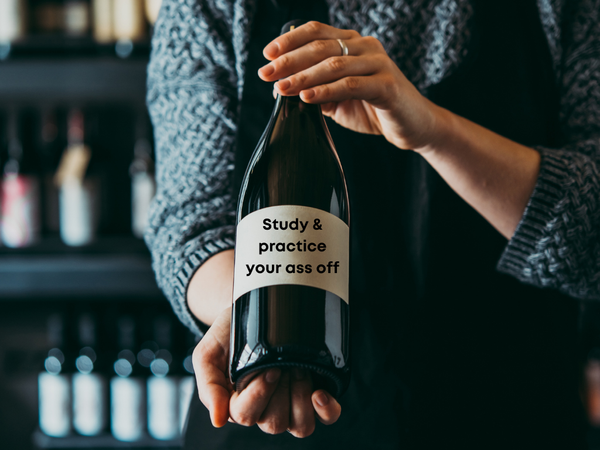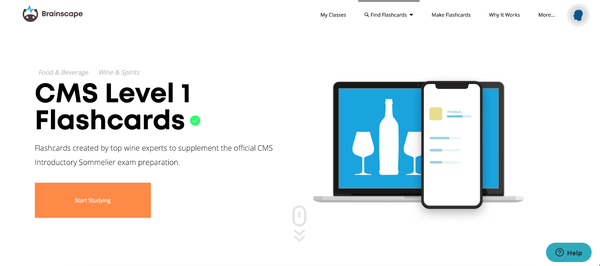 from the Court of Master Sommeliers Level 2 exam" width="740" height="416" />
from the Court of Master Sommeliers Level 2 exam" width="740" height="416" />In this guide, we lay out the challenge ahead of Certified Sommelier candidates and how they can do really well in the exam.
 from the Court of Master Sommeliers Level 2 exam" width="740" height="416" />
from the Court of Master Sommeliers Level 2 exam" width="740" height="416" />
Welcome to Brainscape’s official guide on what to expect from the Court of Master Sommeliers* (CMS) second-level certification program and exam!
You’re here because you want to decant the mystery behind the challenge you’ve signed up for: becoming a certified sommelier. And we’re excited to be at your service in this regard because if there’s one thing the wine team at Brainscape loves more than drinking good wine, it’s helping fellow wine lovers embark upon successful careers.
So, in this certified sommelier study guide, we’ll be answering the following key questions:
At all times, it’s important to remember the three overarching goals of the certified sommelier level: to test your proficiency in (1) deductive tasting, (2) wine and beverage theory, and (3) technical and salesmanship skills in table-side service.
Once you’ve passed through the exam, even if you were all anxious going in, you’ll officially be a certified sommelier!
So let’s not waste a moment further: we are Brainscape, the world’s smartest study app for aspiring sommeliers just like you, and this is our guide on what to expect from the second tier of the Court of Master Sommeliers’ training program!
Pssst. Did you know Brainscape has certified flashcards for the CMS Introductory Sommelier (Level 1) course? This comprehensive collection has been curated by our team of wine experts and contains all of the most important facts you need to know, which is an excellent revision for the CMS Level 2. You can also use Brainscape to make flashcards as you progress through your course material.
Also, coming soon: Brainscape’s Certified Sommelier Level 2 flashcards! *watch this space*
Though not restrictive, an education with the CMS is primarily targeted at individuals who want to work in the hospitality industry—restaurants, hotels, bars, luxury yacht charters, private clubs, cruise ships, or consulting—as sommeliers or wine/beverage directors.
The CMS Certified Sommelier level actually strongly recommends that candidates have a minimum of three years’ experience in the wine/service industry, and that they have passed the Introductory Sommelier level within the past three years. If it’s been longer (up to five years), you’ll need the written recommendation of a Master Sommelier who is mentoring you.

Now, in terms of how the course is structured … well, there really isn’t one. You’ll be assigned a mountain of material to work through, which you must learn BEFORE you attend the in-person classes.
(That’s if there are any in-person classes: some people earn their qualification entirely online, with the exception of having to come in for the examination at the end.)
This brings me to one of the most important things you need to know about the CMS Sommelier certification program .
Your education is entirely up to you.
If your program includes in-person classroom time, usually it’s only a day or two, and that is purely for problem-shooting, high-level content review, and practical skills development. In other words: do NOT go into that space thinking they’re going to teach you what you need to know. You need to get all of your studying done beforehand.
In this way, the Court of Master Sommeliers turns traditional education on its head: you don’t arrive at class knowing nothing, take notes, and then study afterwards. Nope, you arrive at class knowing as much as you possibly can having spent months (a year is actually the recommended study time) learning the content they’ve assigned you.
So, now you’re probably wondering two things:
You know, it’s rather serendipitous that you ask these questions because they just-so happen to be the next sections addressed in our certified sommelier study guide!
I love it when things work out.

The Certified Sommelier examination is a one-day ordeal with three separate sections, each of which you’ll have to pass with a minimum of 60%.
That’s right: doing well in one section will not resuscitate your lack-luster performance in another. So you need to be proficient in all three areas of the Certified Sommelier levels: content knowledge, deductive tasting skills, and service and sales skills.
On the day of your examination, you be taking three individual assessments:
Pass all of the above with a minimum of 60% and you’ll become a Certified Sommelier!

Of course, our goal is to get you through the exam with much more than the aforementioned 60% so now, finally, let’s take a look at the best way to prepare for the Court of Master Sommeliers’ level 2 examination …
The Court of Master Sommeliers recommends that you take ONE YEAR to prepare before taking the exam. And since they kinda know what they’re talking about, we recommend you listen to them. (Unless you have unique circumstances, like, you’re retaking the Certified Sommelier exam or have advanced experience and training under your belt, etc.)
So, our first nugget of advice is to give yourself time to prepare properly.
Right. You’ve got one year. Now, on day one of your journey to becoming a Certified Sommelier, you should work out a detailed strategy (study and practice schedule) to guide you through the mountain of assigned reading and study material so that you arrive at the exam having:
Your study plan needs to portion out all the course material between now and then, with time for daily review (otherwise you’ll just forget it) and skills practice (service and sales).
Okay, so let’s address the obvious: a year is a long time to plan in such painstaking detail, so we suggest that you plot your path forward in broad strokes at first; with a more detailed strategy for the next one to three months. Then, after that initial stint, you can review where you’re at and adjust your plan accordingly (if necessary).
Remember to frequently view your progress from a 30,000-foot view to make sure you’re keeping up a decent pace and aren’t getting bogged down in the minor details.
Pro Tip: Use Brainscape to create flashcards for the most important facts and then study them anytime, anywhere, on any device via our sophisticated spaced repetition algorithm! This is proven to help you learn information twice as fast as more conventional study techniques.
You can also find other users’ flashcards for the Certified Sommelier course by upgrading to Pro, such as the linked one by Michael Harper. And, as I mentioned previously, you can lean on Brainscape’s certified CMS Level 1 flashcards for studying, with CMS Level 2 flashcards coming soon!
 digital flashcards available from Brainscape to supplement your official test prep" width="1600" height="710" />
digital flashcards available from Brainscape to supplement your official test prep" width="1600" height="710" />
The more you expose yourself to the information you need to memorize for the Court of Master Sommeliers exam, the better. But reading and re-reading the textbook would be insufferably boring. So, instead, use a mix of study formats and modalities to repeatedly engage with the information, like:
Pro Tip: print one poster-sized map to stick up on your wall—without any written information on it—and a smaller reference map, which you can hold in your hand, with all the written information on it. Then, try to recall from memory the names of all the regions, sub-regions and their chief varietals and styles of wine, etc. If you struggle to remember something, refer to the smaller map in your hand. Practice this often and you’ll soon have a highly visual way of remembering a LOT of information.

You should know the tasting grid like the back of your hand. It should be so familiar, comfortable, and instinctive that you hardly need to think about it. To do this, be strict about rigorous practice and follow the same tasting format (process) each and every time you blind taste.
So, for example, if you always go through your palate structure calls before you assess your fruit, earth, and wood notes, do that every single time. Don't bounce around. This will make grading you easier and it will help you tick off the mental boxes or hit the same goalposts every single time you taste.

Let’s not forget about spirits, beers, cocktails, and sake!
At the certified sommelier level, you're tested on classics, not esoterics. So, know at least three brand examples of each major spirit, and within that, know two examples of each subset. In other words: know two examples of Western-style gin, two examples of London Dry, two examples of Martinique rum, and two examples of Añejo Tequila, etc.
You should also know three brand examples of major styles of beer and which country they're from.
For cocktails, know at least three classics from each major spirits category, like brandy, vodka, gin, rye, bourbon, tequila, rum, and scotch. You should also know the major brands that are mixers, like Southern Comfort, Bailey's, and Tia Maria, as well as their base spirits and flavors.
And finally, for sake, know the major styles, rice grains used, making methodology, and a few key terms, for example, the Japanese word for “barrel-aged” or “unfiltered”. At this level, you won’t need to know the name of brewers, prefectures, or water.
Of all the times to be an overachiever, your certified sommelier exam is NOT one. Stick strictly to the materials they give you. Everything that shows up in the exam will come directly from these. So, don’t waste time on Netflix documentaries, wine podcasts, and the like … unless you’ve spent a full day studying and are now treating yourself to a little break.
Sure, you may not be able to answer many of the questions because you haven’t yet learned the material. but exposing your brain to the types of questions you’re going to have to answer in the exam primes it for learning.
You’ll also get a great idea of what to expect from the exam, how long it is, how the questions are phrased, and what content is covered. So, as you work through the CMS coursework, you’ll be able to view the content through the eyes of the examiner. THIS will put you in an excellent position to study efficiently and score excellent grades.

Your goal is essentially to walk into your Sommelier Certification class as far along in your learning as you can possibly get on your own. Then, use that class time, which is really a whirlwind review course, to work out any persistent issues you might have. You shouldn’t rely on class time to learn anything from scratch. Class time is intended for:

In this certified sommelier study guide, we’ve essentially covered everything you need to know before you step into the arena with the CMS Level 2 exam in wine, from how it’s formatted to all the juicy tips you need for success.
None of this excellent advice, however, can substitute for good, hard work so draw up that detailed study plan and devote yourself daily to learning. It’s through chipping away at that mountain of learning that you’ll arrive at the exam fully prepared and confident.
Remember, with good daily study habits and a healthy attitude you can and will rise to the challenge of becoming a Certified Sommelier!
*Disclaimer: Brainscape has worked with top wine experts to supplement the official publications and preparation offered by CMS. We are not affiliated with the CMS itself.